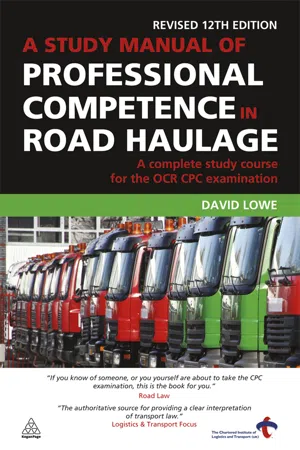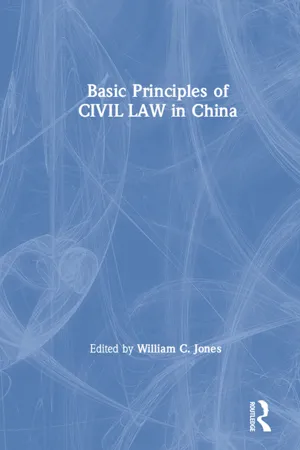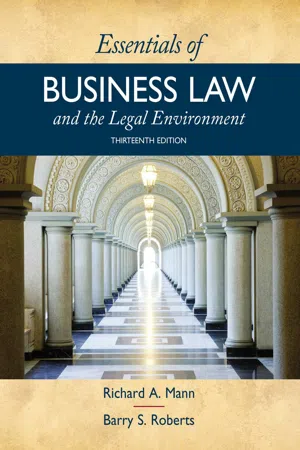Law
Civil Law
Civil law is a legal system based on written laws and codes, as opposed to common law, which relies on judicial decisions and precedents. It governs private disputes between individuals or organizations, such as contracts, property, and family matters. Civil law aims to provide a clear and comprehensive framework for resolving conflicts and enforcing rights and obligations.
Written by Perlego with AI-assistance
Related key terms
1 of 5
8 Key excerpts on "Civil Law"
- James Walsh(Author)
- 2002(Publication Date)
- Auerbach Publications(Publisher)
429 15 The Civil Law DEFINITION Civil Law in the United States is that vast body of statutory and common law that deals with private rights and remedies. Although the state may be a party in Civil Law matters, the principal impact is to establish and adjudicate rights as between or among private persons, both natural and corporate. The term “Civil Law,” as used in the United States (and in other common-law countries), has a somewhat different meaning than when it is used elsewhere, primarily in Europe. Civil Law in Europe generally refers to the organized sys-tem of codified law which began with the Roman Empire under Justinian and continued under his successors. This body of law, more correctly referred to as the “civil code,” is in many ways quite different from Anglo-American common law and includes both penal or criminal elements, as well as noncriminal. In the United States, the state of Louisiana retains a large portion of the French civil code — a heritage from the period when it was a French possession. Similarly, the Commonwealth of Puerto Rico incorporates some aspects of the Spanish civil code in its local law. The remainder of the discussion on Civil Law will deal with Civil Law as it is known in the United States. In any special context in which the European civil codes are meant, they will be so identified. MAJOR BRANCHES The distinction made in the preceding chapter between statutory and common or case law must be kept in mind. The asset protection professional will find large areas of responsibilities governed by statutory provisions, both federal and state, and will also find that, on a daily basis, decisions and actions are affected in a major way by the civil common law, especially the Civil Law of torts.- eBook - ePub
- Tom Craig, David Campbell(Authors)
- 2012(Publication Date)
- Routledge(Publisher)
At their simplest, matters of Civil Law and criminal law can be distinguished according to the perceived seriousness of the offences. Civil and criminal law are two distinct areas of legal practice and are overseen by separate parts of the judiciary.In matters of Civil Law, individuals can bring other individuals (or legal entities, such as companies) to the judiciary in order to have disputes settled. A civil matter is one in which a legal entity feels that they have a legitimate grievance against another, but the ‘offence’ is a matter which is not serious enough for the state to bring the case to a criminal court.The nature of the ‘offence’ is not considered to be a threat to society as a whole. In civil cases, the judiciary therefore acts as an umpire, ensuring that wrongs are redressed and that fairness is enforced. Once a civil court has made a judgement, the ruling carries the authority of the state.Some of the most common civil disputes concern matters of tort. The Law of Torts concerns legal wrongs against an individual which gives the plaintiff (the party that brings the complaint – see later) a right of civil action for damages, but which do not arise over matters of breach of contract or trust. It is a broad expectation in society that individuals should have the right to pursue their lives without personal offence to their persons, property, etc. and to enjoy their possessions and property without unreasonable intrusion by others. Tort concerns such things as trespass, nuisance, negligence and defamation of character. It gives individuals the right of legal redress when they have been offended against in these matters.A criminal case is one in which the offence is viewed as being of sufficient seriousness that, even although it may be an individual that has been ‘wronged’ the case against the alleged offender is brought by the state (or the Crown) in the form of the Crown Prosecution Service (CPS) for England and Wales. In Scotland, the Crown Office and Procurator Fiscal Service - eBook - ePub
- Ralph Brislin(Author)
- 2014(Publication Date)
- Butterworth-Heinemann(Publisher)
Most states regulate Civil Law for actions between persons, corporations, local governments, etc. Civil Law developed over the years to resolve conflicts among people that may not necessarily involve criminal behavior or action. In Civil Law proceedings, one party (an individual or group of individuals) brings action or sues another party for a variety of reasons, including breach of contract, vicarious liability, negligence, false arrest or imprisonment, malicious prosecution, assault, battery, trespass, emotional distress, defamation, invasion of privacy, excessive use of force, etc.Many of the reasons cited above that involve Civil Law are also considered to be a tort. Tort is a breach of duty—a failure to act on the part of one party to another. In Civil Law proceedings when one party sues another, the plaintiff (person who initiated the legal action) will normally seek money from the defendant (person who is being sued).Torts differ from crimes in that for a crime to have occurred, intent must be proven. For example, in virtually every state, two elements that must exist for there to be a specific crime are “knowingly” and “willingly”. To commit a crime, a person must know that what they are doing is unlawful, yet they still choose to commit the offense. With regard to torts, intent is not a requirement. Rather, a person has a duty to do something. If the person fails to perform the duty, even though they did not desire another party to be injured, they will still be guilty of committing a tort.Civil cases or lawsuits are decided by a judge or jury after attorneys for both sides have presented their cases. In Civil Lawsuits, the plaintiff needs only to prove their claim as measure by a preponderance of the evidence. Preponderance of the evidence means that at least 50.1% of the evidence presented in the case supports one person’s claim more than the other. In criminal cases, the defendant must be judged guilty beyond a reasonable doubt. It is easier to prove a claim in a civil case than in a criminal one. - eBook - PDF
- Kit Barker, Simone Degeling, Karen Fairweather, Ross Grantham, Kit Barker, Simone Degeling, Karen Fairweather, Ross Grantham(Authors)
- 2017(Publication Date)
- Hart Publishing(Publisher)
The areas of law drawn into focus are the law(s) of contract, tort, property, trust, equity, company law and civil proce-dure rules governing class actions and litigation funding. Views as to whether all of these contributions relate squarely to ‘private law’ will inevitably differ, since different classifications of ‘public’ and ‘private’ law are possible. 9 If one concep-tualises private law as that part of the law that governs the protection of our pri-vate interests as individuals, as opposed the rights we enjoy because we are public citizens, most, but not all (or not all of all) contributions fall within it. 10 On this definition, statutory rules that serve to define or alter the substance of common law rules of contract or tort (such as the Unfair Contract Terms Act 1977 in the United Kingdom, or the Civil Liability Acts in Australia) form part of the very fab-ric of modern private law and therefore lie clearly within its domain. By contrast, human rights provisions such as section 7 of the Human Rights Act 1998 (UK), which give private citizens the right to bring actions in common law courts for the state’s failure to observe or implement the fundamental rights and protections set out in the European Convention on Human Rights, protect rights which those individuals enjoy as part of the polity of public citizens, not their private interests per se ; and so fall outside private law, even if they also operate, as they do in the United Kingdom, indirectly to add momentum to the development of the private law in civil disputes. Part 2 (‘Power, History and Society’) commences with three chapters that take a broad, historical and contextual approach to the relationship between private law and power, looking at aspects of the law of contract, consumer law and tort law. - eBook - ePub
A Study Manual of Professional Competence in Road Haulage
A Complete Study Course for the OCR CPC Examination
- David Lowe(Author)
- 2010(Publication Date)
- Kogan Page(Publisher)
Part 1Civil Law
This part covers Directive items A1 and A2 and subjects in OCR Units 1 and 2.INTRODUCTION TO LAW
Although not specifically part of the Civil Law syllabus material, it is useful in this introduction to explain the basic principles of law and the legal institutions as a background to the study of contracts, legal liabilities and the liabilities of employers, employees, subcontractors and agents, and the CMR contract.Law is a word that describes a general rule of conduct. In the context of our study it may be defined as ‘the body of principles recognized and applied by the State in the administration of justice’ (Sir John Salmond, Jurisprudence ). ‘The law as a body has as its aim the attainment of justice in society’ (R S Sim and D M M Scott, ‘A’ Level English Law ).Relationship of common law, statute law and legal precedent
The laws observed in operating transport are derived from common law or statute law and also legal precedent. Additionally, European Union law and the requirements of international agreements and conventions, to which the UK is a signatory, must be observed.Common law
Common law is established by practice or custom over a long period of time rather than being enacted by the State, but many aspects of common law or ‘practice’ have become absorbed into our legal system as a result of being adopted by courts in the past as the basis for judgements. Once customs and practices are adopted by the courts they become precedents which other courts either must follow (binding precedents) or may follow (persuasive precedents).Before 1873, law existed in the form of common law and equity, which was a system designed to overcome defects in the common law system. The Judicature Acts 1873/75 were responsible for drawing together the processes of common law justice and equity, which had previously been separately administered – common law in the common law courts and equity in the Chancery Court. - eBook - ePub
- David M Jones(Author)
- 2019(Publication Date)
- Routledge(Publisher)
Within the field of Civil Law norms, there are a large number that are optional. That is, the exercise or abandonment of some Civil Law right can be decided on by the holder of the rights. When some Civil Law rights are trespassed against, if the injured party does not initiate suit, the court will not decide the matter. These situations, for the most part, involve the rights of citizens among themselves. Since whether or not the citizen exercises these rights does not hinder the general social good, the will of the individual must be respected. However, if the circumstances mentioned above arise between socialist organizations, particularly between organizations with property owned by the whole people, the situation is not the same because their exercise of their lawful rights not only affects the interests of the organization, but has a close relation to the upholding of the state’s economic interest, and the economic order, as well as the effectiveness of the state economic plan. Therefore they can not, at will, abandon these lawful rights as citizens can. When a Civil Law dispute arises among them, and they are unable to negotiate a settlement, they must seek arbitration by an arbitration organ, or bring an action in a court. [Thus] the socialist organizations can distinguish clearly that which is right and wrong, clearly divide up responsibilities and receive state supervision in order to reform their work, and fulfill their responsibilities. When certain Civil Law disputes between socialist organizations result in very serious consequences for the national economy, the state must intervene. Every level of our country’s procuracy is a supervisory organization of the law. It has the right to investigate not merely in criminal, but also, in the same way, in civil cases. This is because in our country’s economic sphere all relations are “public.” In order to protect lawful Civil Law rights, the concerned units may support the action. Section 13 of the [Trial] Civil Procedure Code of the People’s Republic of China provides that “Organizations, collectivities, enterprises and units, in regard to acts that injure national, collective or individual rights, may support the action of the injured unit or individual in the people’s court.”Civil Law rights (property rights, personal rights) are protected not only by our country’s Civil Law, but also by our country’s criminal law, administrative law, and other related laws.VIICIVIL RESPONSIBILITY
1. The General Concept of Civil Responsibility
The content of Civil Law relations is formed by Civil Law rights and duties. When the subject of Civil Law does not perform his duty he may harm the rights of the other party. At the same time he violates a legal rule. Consequently, he must assume civil responsibility.Civil responsibility refers to the legal consequences incurred when the subject of Civil Law violates his duty. It is a kind of independent responsibility within legal responsibility. Its special characteristics are:(1) Civil responsibility is premised on the existence of a Civil Law duty
A Civil Law duty arises according to the provisions of law and the agreement of the parties. Actually the duty agreed upon by the parties arises according to law, and, as a result, this duty has legal effectiveness. Section 6 of our Economic Contract Law provides that “as soon as an economic contract is formed according to the law, it has legally binding force and the parties must fully perform the obligations stipulated in the contract.” It may be seen that regardless of whether a duty is prescribed by law or by agreement of the parties, every party must completely perform his own duty. The violation of the duty is a kind of unlawful act and it must be punished by the law. - Richard Mann, Barry Roberts(Authors)
- 2018(Publication Date)
- Cengage Learning EMEA(Publisher)
C HAPTER 3 Civil Dispute Resolution 44 C HAPTER 4 Constitutional Law 68 C HAPTER 5 Administrative Law 88 C HAPTER 6 Criminal Law 104 C HAPTER 7 Intentional Torts 121 C HAPTER 8 Negligence and Strict Liability 139 The Legal Environment of Business PA RT I I Copyright 2019 Cengage Learning. All Rights Reserved. May not be copied, scanned, or duplicated, in whole or in part. Due to electronic rights, some third party content may be suppressed from the eBook and/or eChapter(s). Editorial review has deemed that any suppressed content does not materially affect the overall learning experience. Cengage Learning reserves the right to remove additional content at any time if subsequent rights restrictions require it. 44 C H A P T E R O U T C O M E S After reading and studying this chapter, you should be able to: 1. List and describe the courts in the federal court system and in a typical state court system. 2. Distinguish among exclusive federal jurisdiction, concurrent federal jurisdiction, and exclusive state jurisdiction. 3. Distinguish among (a) subject matter jurisdiction and jurisdiction over the parties and (b) the three types of jurisdiction over the parties. 4. List and explain the various stages of a civil proceeding. 5. Compare and contrast litigation, arbitration, conciliation, and mediation. Laws are a dead letter without courts to expound and define their true meaning and operation. Alexander Hamilton The Federalist (1787) C H A P T E R 3 Civil Dispute Resolution A s discussed in Chapter 1, substantive law sets forth the rights and duties of individu-als and other legal entities, whereas procedural law determines how these rights are asserted. Procedural law attempts to accomplish two competing objectives: (1) to be fair and impartial and (2) to operate efficiently. The judicial process in the United States represents a balance between these two objectives as well as a commitment to the adversary system.- eBook - PDF
An Introduction to the Comparative Study of Private Law
Readings, Cases, Materials
- James Gordley, Hao Jiang, Arthur Taylor von Mehren(Authors)
- 2021(Publication Date)
- Cambridge University Press(Publisher)
Most recently, General Provisions of Civil Law was enacted by congress in 2017, which is intended to become the first book of future Chinese civil code. General Provisions reinforced certain general principles of tort law laid down by General Principles of Civil Law and Tort Liability Law. At present, both 2017 General Provisions of Civil Law and 1986 General Principles of Civil Law are in force. Contemporary Chinese tort law has adopted the fault liability regime with the supplements of strict liability and “liability in equity.” Though tort law damage is still considered compensatory in nature, punitive damages are allowed in the areas of product liability if the producer’s intention or knowledge of the defect can be proved. 1 The victim can also recover for moral damage arising out of torts to personal rights and interests that have caused her severe mental distress. 2 In addition, in contrast to the Republic of China’s (ROC’s) Civil Code, Article 188, vicarious liability is based on non-fault liability following the Anglo-American and French traditions – an employer will be jointly liable for the tort committed by an employee during the course of employment even if the employer has exercised due care in the selection and control of the employee. 3 1. See TLL art. 47. 2. See TLL art. 22. 3. For example, see Supreme Court’s Interpretations on Personal Injury Cases, art. 9. 314 TORT LAW iii. The Scope of Rights Protected Every tort law system has to deal with a fundamental question – what rights are to be recognized and protected by tort law? If one only looks at the wording of civil codes, one might think that some tort law systems protect a person against every sort of harm while others protect a select list of rights enumerated in the civil code. The French Civil Code seems to take the first approach.
Index pages curate the most relevant extracts from our library of academic textbooks. They’ve been created using an in-house natural language model (NLM), each adding context and meaning to key research topics.







